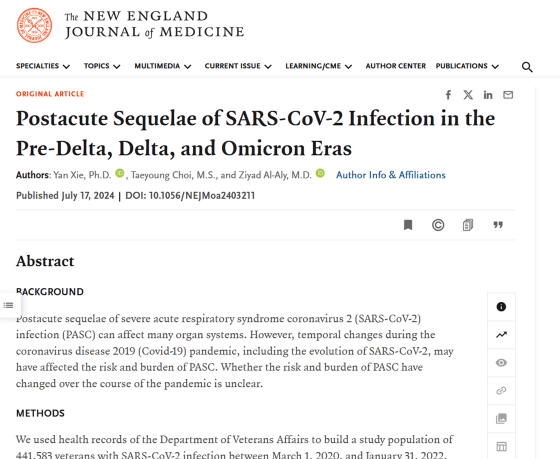It turns out that the risk of developing the new corona sequela 'Long COVID' gradually decreases over the course of the pandemic

Some patients with COVID-19 suffer from '
Postacute Sequelae of SARS-CoV-2 Infection in the Pre-Delta, Delta, and Omicron Eras | New England Journal of Medicine
https://www.nejm.org/doi/full/10.1056/NEJMoa2403211

Risk of long COVID declined over course of pandemic – Washington University School of Medicine in St. Louis
https://medicine.wustl.edu/news/risk-of-long-covid-declined-over-course-of-pandemic/
Vaccine slashes chance of long Covid, says study, but risk remains
https://www.statnews.com/2024/07/17/long-covid-risk-reduced-by-vaccination-coronavirus-nejm-study1182483/
Vaccines Significantly Reduce the Risk of Long Covid, Study Finds - The New York Times
https://www.nytimes.com/2024/07/17/health/long-covid-vaccines.html
The US research team extracted 441,583 veterans who developed COVID-19 between March 1, 2020 and January 31, 2022 from health data from the Department of Veterans Affairs , and 4,748,504 veterans who did not develop the disease. About three-quarters of the people studied were white, 91% were male, and the average age was 64 years old.
We then analyzed the long COVID risk one year after the onset of COVID-19, dividing the data into three periods: 'early pandemic strains (before vaccination began),' ' Delta strains (June 19, 2021 to December 18, 2021),' and ' Omicron strains (December 19, 2021 to January 31, 2022).'
The analysis found that early-pandemic strains were associated with 10.42 per 100 patients with long COVID, compared with 9.51 per 100 for unvaccinated patients infected with the Delta strain and 5.34 per 100 for vaccinated patients, suggesting that vaccinated patients have a lower risk of long COVID. Additionally, the Omicron strain was associated with a lower risk of long COVID in unvaccinated patients (7.76 per 100) compared with 3.5 per 100 for vaccinated patients.

They also report that the symptoms of Long COVID are changing over time: While debilitating fatigue was the predominant feature of Long COVID early in the pandemic, gastrointestinal, metabolic and musculoskeletal problems are now outweighing fatigue in the Omicron strain.
The results of this study not only show that the risk of long COVID gradually decreases over the course of the pandemic, but also that vaccination significantly reduces the risk of long COVID. The research team's analysis concluded that 72% of the reduction in the risk of long COVID in vaccinated individuals is due to the vaccine, and the remaining 28% is due to genetic mutations of the virus and improvements in the medical system.
'There's a clear and significant difference in risk between vaccinated and unvaccinated people during the Delta and Omicron periods,' said Ziyad Al Ali, co-author of the paper and director of the VA Clinical Epidemiology Center in St. Louis. 'So if people think COVID-19 isn't a big deal and they forgo getting vaccinated, they essentially double their risk of long COVID.'

On the other hand, Ally argues that the figure of 3.5% of vaccinated people developing long COVID with the Omicron strain still represents a significant risk. 'That means 3 to 4 people out of 100 will develop long COVID. If you multiply that by the number of people who are repeatedly infected and reinfected, the number is much higher. This risk is not small,' he said.
Related Posts:
in Science, , Posted by log1h_ik







